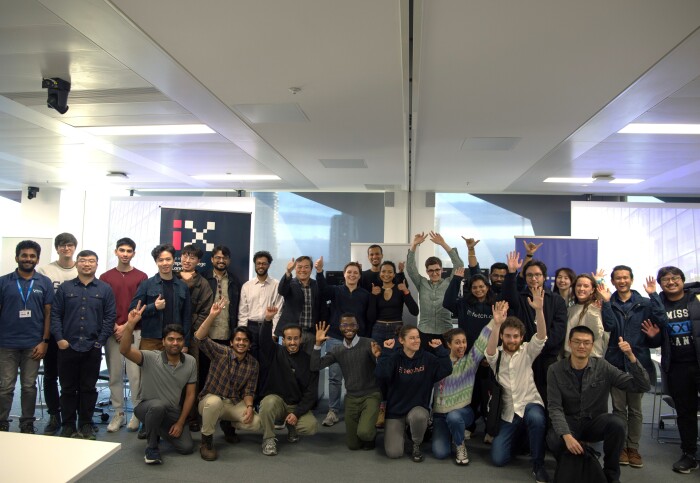Imperial students tackle vaccine hesitancy during the Hackathon

Students harnessed Fetch.ai’s agents technology to address vaccine hesitancy during a two-day Hackathon at I-X.
This weekend, MSc and PhD students from Imperial College London and affiliated CDTs at King’s College London participated in a two-day Hackathon organised by I-X Business Partner, Fetch.ai Innovation Lab. Hosted at I-X (White City Deep Tech Campus), the event brought together participants from nine Imperial Departments: Chemical Engineering, Computing, Dyson School of Design Engineering, Earth Science and Engineering, Electrical and Electronic Engineering, Mechanical Engineering, Surgery and Cancer, Chemistry, and Mathematics.
During the hackathon, participants were tasked with creating AI applications aimed at tackling vaccine hesitancy using Fetch.ai’s uAgents technology. The challenge, provided by Moderna, an Imperial Business Partner, required attendees to develop solutions to help Medical Affairs understand and address the factors contributing to vaccine hesitancy. The AI agent-powered tools were designed to map patient journeys, identify key touchpoints for intervention to prevent the spread of misinformation, and personalise engagement strategies for individuals and communities to enhance the impact of interventions.
Innovative Solutions
Seven teams presented their final projects to an expert panel, including Phillip Cruz, Country Medical Director at Moderna (Chair); Satwik Kar, National Medical Science Liaison at Moderna; Kshipra Dhame Developer Advocate at Fetch.ai; and Abhi Gangani, Developer Advocate at Fetch.ai. Out of seven innovative projects, three were awarded prizes.
The first prize, “Beyond Boundaries AI Agent”, was awarded to the I-X Vaccine Hesitancy Management Dashboard. This project included the vaccination dashboard offering comprehensive vaccination data for both medical professionals and patients, a social media analysis tool, and an AI-powered mapping system aimed at improving patient-doctor interaction. The team comprised Abdulaziz Alsaad, Lyson Ober, Asish Sayana, Santosh Kumar Saravanan, and Sherwin Vadakkumcherry.
The second prize, “Smartest AI Agent”, went to the Vax Lens. Their project tackled vaccine skepticism by addressing the spread of misinformation on social media platforms. The Vax Lens tool analyses vaccine-related posts on X and Bluesky to identify negative sentiment and then offers scientifically accurate responses to the posts created by an AI agent. The team included Alireza Darzi, Tim Liu, Kevin Michalewicz, Paula Cordero Encinar, and Rebecca Langdon.
The third prize, “Best use of Fetch.ai Tech”, was awarded to the Hack VHS. This project centred around user profiling, with AI chatbots providing individuals with tailored information aimed at tackling their vaccine hesitancy. The team included Emma Pajak, Tristan Spreng, Arushi Sinha, Piotr Toka, and Stephen Asiedu.
Collaborative Effort
The event was a fantastic opportunity for participants to design their own solutions to the challenge and learn about Fetch.ai’s innovative AI agent technology. Commenting on the significance of the event, Sana Wajid, Chief Development Officer of Fetch.ai Innovation Lab, said: “The hackathon showcased the incredible talent and creativity of students as they embraced Fetch.ai's technology to tackle real-world industrial challenges. It was inspiring to see how their innovative ideas came to life, demonstrating the power of combining fresh perspectives with cutting-edge tools. This event truly highlights the potential of collaboration in shaping a smarter, more connected future.”

Satwik Kar, National Medical Science Liaison at Moderna, stressed the quality of the solutions presented and highlighted how AI can help tackle modern world challenges: “The quality of the solutions presented was outstanding, bold, and impactful, demonstrating how AI can rise to meet global challenges such as vaccine hesitancy. These innovative solutions proposed, promise to foster trust and advance global health outcomes.”
Article text (excluding photos or graphics) © Imperial College London.
Photos and graphics subject to third party copyright used with permission or © Imperial College London.
Reporter
Wiktoria Tunska
Institute of Global Health Innovation





